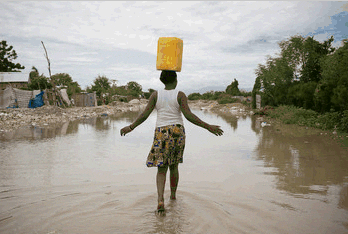Oxfam is delivering water purification kits and construction materials in some of areas of Haiti worst affected by Hurricane Matthew.
More than 300 people have been killed in the country’s worst-hit South department alone, according to Civil Protection authorities. The number of deaths is likely to rise.
Thousands of people have lost their homes. Official data shows that 29,000 homes have been destroyed in the South and Grand Anse departments. Vast areas have been flooded across south-eastern Haiti and more people could lose their homes.
Jean Claude Fignole, Oxfam’s program director in Haiti, said: “We fear that the numbers are going to increase considerably as emergency teams advance. What is most urgent now is to provide safe water to prevent disease, as well as food and essential supplies. In the longer term, we fear a jump in cholera and malnutrition cases due to crop losses. Mobilisation of the international community in support of the Haitian people is urgently needed.”
Oxfam teams are beginning to distribute aid in the towns of Saint Louis du Sud, Maniche, Les Cayes and Cavaillon, which are among the worst affected by the hurricane. They are distributing hygiene items and water purification tablets to prevent diseases such as cholera or diarrhoea, and also construction materials. Oxfam is also preparing to repair and install water tanks.
In Haiti’s capital Port au Prince, many people have also suffered the consequences of Hurricane Matthew, but to a lesser extent.
Marcele Duby, who lives in the Truitier neighbourhood of Port au Prince, said to Oxfam: “If it had occurred in the middle of the night I would have lost my children. But it was broad daylight, and so I could save them. The water in the house was up to my waist. I was afraid because if the water had risen a little more we couldn’t have done anything.”
Some 60,000 Haitians live in camps in the capital following the 2010 earthquake which killed at least 230,000 people. Many of them have lost their few belongings due to the hurricane. Many streets in poor neighbourhoods of the capital like Ti-Ayiti remain flooded.
Jimmy Leys, a resident of Ti-Ayiti, said: “Children are going to fall sick because flooding causes epidemics. Some pregnant women are already ill. Diarrhoea and malaria are diseases well known here.”
Oxfam calls on the international community to step in and support an immediate humanitarian response. The Haitian government must work with local and international organisations to save lives. Lost harvests and continued flooding make those most affected vulnerable to a food and health crisis that needs to be prevented.

| [donate]
| Help keep news FREE for our readersSupporting your local community newspaper/online news outlet is crucial now more than ever. If you believe in independent journalism,then consider making a valuable contribution by making a one-time or monthly donation. We operate in rural areas where providing unbiased news can be challenging. |

















